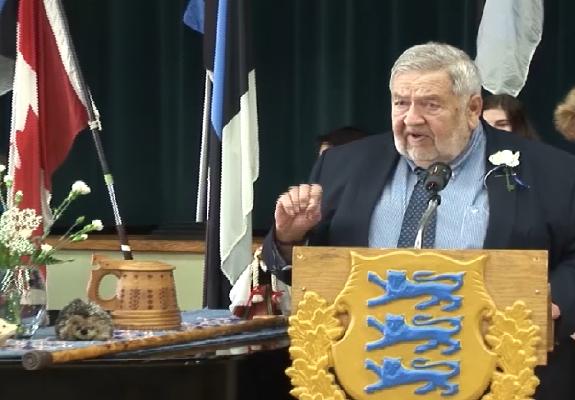
(Birthright here does not refer to ethnic, racial or to other related criteria. Birthright in this context refers to possession of Estonian citizenship during pre-1940 years, prior to the Soviet or German occupation or having at least one predecessor that did, irrespective of ethnic/racial origin.)
Most members of the Centre Party, Pro Patria (IRL), Social Democrats and Estonian Conservative People's Party voted against the proposed legislation, which would have amended current law that prohibits dual citizenship. The current law contradicts the Estonian constitution, which states that individuals possessing citizenship by birthright cannot be stripped of it. By the constitution, Estonian citizenship obtained by descent is inalienable and cannot be removed be anyone other than the citizenship owner. The constitution supersedes any legislation.
Why the list of non-European countries that would be exempt from having their dual citizens relinquishing Estonian citizenship? The Reform Party states that the chosen non-European countries have communities of Estonians, mainly descendants of the 1944 refugees, practically all of whom qualify by birthright to have Estonian citizenship. In addition the countries also share the “same realm of values” as Estonia, are not totalitarian in governance and do not represent any current or past threat to Estonia's sovereignty.
After the collapse of the Soviet Union, Russia being a self-proclaimed successor state to the Soviet Union, all former citizens of the USSR qualified for citizenship of the Russian Federation. Estonia's policy of requiring the naturalization of post-war immigrants was partially influenced by Russia's citizenship law and the necessity to prevent dual citizenship. This was bolstered by the internationally accepted international understanding and legal principle that individuals who settle under the regime of an occupying power gain no automatic right to nationality. In fact the Geneva Convention (International Human Rights) clearly stipulates that the transfers of the civilian population of the occupying power (USSR) into the occupied territory (Estonia), regardless whether forcible or VOLUNTARY is prohibited. (The Soviet Union then and Russia now self-righteously disregards this saying civilians were brought in and were exclusively provided with new housing, ignoring the severe housing shortage suffered by the Estonian population, to satisfy employment requirements of industrialization.)
This guided the passing of Estonian citizenship legislation immediately after the re-establishment of independence in 1991 of not allowing dual citizenship (except for those connected to Estonian citizenship by birth or by being a citizen's descendant).
With the restoration of the independent Estonian state, and taking into consideration that the Soviet era was a period of illegal occupation, Estonian guaranteed citizenship to all citizens of pre-Soviet Estonia, and their descendants, not all Soviet citizens living on Estonian territory. The adhered to the legal principle of ‘jus sanguinis’ (citizenship based on birthright, amongst other related criteria) as opposed to ‘jus soli’ (citizenship based on soil or place of birth).
The new law went totally against the leader of the Centre Party at the time, Edgar Savisaar's “null variant” position (all residents of Estonia to be automatically granted citizenship), a position that the Centre Party has backed for years.
The dual citizenship issue has been under debate several times before. Estonia has been accused of discrimination in the past by giving ‘preferential’ treatment to those who qualify by birthright and now by designating countries whose citizenship would be permitted to be held by Estonian citizens. But it is not uncommon for countries that permit dual citizenship for its own citizens to thus specify these countries.
Some countries that allow dual citizenship: Canada, U.S., Egypt, Finland, Hungary, Poland (41 in total that have a clear policy). Some countries that don’t allow it: Estonia, Latvia, Lihtuania, Slovakia, Norway, Russia (45 in total).
Although Pro Patria and the Centre Party have been for decades on opposite sides of the dual citizenship issue, their common opposition this time to allowing a qualified expansion of dual citizenship seems at first glance very strange. However observers have pointed out that their motivations were significantly different.
The Centre Party’s members of parliament take into account the orientation of the community of Russian speakers who favour dual citizenship and who in the most part vote for the Centre Party.
Pro Patria is on the other hand sincerely concerned that dual citizenship, even in its limited form, may engender an uncontrolled expansion of citizens, more loyal to an intimidating and aggressive foreign power.
One may be reminded of the Kremlin’s announcement some years ago that their foreign policy will include an enlivened ‘Compatriots Program”, the use of Russians abroad to further their international goals. At the same time Russia announced that they reserve the right to interfere in any foreign setting where they perceive the local Russian population needing their assistance, military or otherwise. Prop Patria is confident that the constitution will protect those who are citizens by birthright.
In a very fundamental way, the Reform Party proposal and the Pro Patria’s stance share basic commonality. Both see the importance of maintaining the ‘jus sanguinis’ principle of citizenship by birthright - Reform in perhaps in a more limited way than Pro Patria.
Might it not behoove for the two sides to find some measure of agreement, and take into account the anxiety of those Estonians abroad, who sincerely value their formal ties to their land of heritage and who may be a benefit, as many Estonian governments have claimed, in promoting Estonia’s interests?
Laas Leivat

























